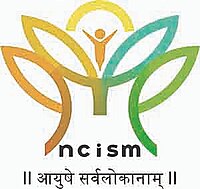The National Commission for Indian System of Medicine (abbreviate: NCISM) is a statutory and regulatory body of 29 members, formed by Government of India for framing policies for institutions engaged in Indian System of Medicine and medical professionals.[1] It replaced the Central Council of Indian Medicine on 07 October 2020. The institution will have Boards of assessment and rating and Board of ethics and registration of practitioners of Indian systems of medicine. This commission is working under Ministry of Ayush and will govern the Board of Ayurveda and Unani and the Board of Unani, Siddha and Sowarigpa.[2]
 | |
| Abbreviation | NCISM |
|---|---|
| Predecessor | Central Council of Indian Medicine |
| Formation | 07 October 2020 |
| Purpose | Regulatory agency |
| Headquarters | New Delhi, Delhi, India |
Chairperson | Vaidya Jayant Yeshwant Deopujari |
| Affiliations | Ministry of Ayush |
| Website | ncismindia |
Indian Medicine Central Council Act, 1970
editIn 1971, Central Council of Indian Medicine was set up under Indian Medicine Central Council Act, 1970 to monitor higher education in Indian systems of medicine, including Ayurveda, Siddha, Unani and Sowa-Rigpa.[3][4][5]
National Commission for Indian System of Medicine (NCISM) Act, 2021
editThe National Commission for Indian System of Medicine was formed in 2020[6] [when?] by the Government of India as statutory body[7][8] by passing The National Commission for Indian System of Medicine (NCISM) Bill.[9][10] The bill was passed in the Lok Sabha, in August 2021, and replaced Indian Medicine Central Council Act, 1970.[11][12]
The National Commission for Indian System of Medicine set up according to the National Commission for Indian System of Medicine Act, 2021, will govern the Board of Ayurveda and Unani and the Board of Unani, Siddha and Sowarigpa.[1][2]
Organisation
editNational Commission for Indian System of Medicine is made up of 29 members appointed by the Central Government.[10][7]
The organisation has two boards, one for assessing and granting educational institution permission for Indian Systems of Medicine, and the other for ethics and registration of practitioners of Indian systems of medicine.[13]
Roles and Responsibilities
editNational Commission for Indian System of Medicine is formed with the following roles and responsibilities:[10][14]
- Frame policies for Institutions engaged in Indian System of Medicine and regulation of medical professionals.
- Assessment of healthcare infrastructure and related human resources.
- Regulations as per bill are adhered by State Medical Councils offering courses in Indian System of Medicine.
- Coordination between autonomous bodies formed under bill.
See also
editReferences
edit- ^ a b "Cabinet approves bill for setting up of National Commission for Indian System of Medicine". mint. 28 December 2018. Archived from the original on 8 July 2022. Retrieved 9 July 2022.
- ^ a b "Cabinet approves new commissions for Indian medicine system and homeopathy". The Indian Express. 29 December 2018. Archived from the original on 9 July 2022. Retrieved 9 July 2022.
- ^ CCIM website Archived 26 February 2011 at the Wayback Machine, retrieved on 15 January 2010
- ^ "Higher education in India". Department of Higher Education, Ministry of Human Resource Development, Government of India. Archived from the original on 16 December 2009. Retrieved 2009-11-16.
- ^ "Professional Councils". 'University Grants Commission' (UGC) website. Archived from the original on 6 January 2010. Retrieved 16 January 2010.
- ^ "National Commission for Indian System of Medicine Introduces New Rules for Ayurveda Colleges". news18.com. 1 August 2022. Retrieved 9 August 2022.
- ^ a b "Delhi HC notice to Centre challenging VJ Yeshwant Deopujari as Chairperson of National Commission for Indian System of Medicine". The New Indian Express. 1 September 2021. Archived from the original on 8 July 2022. Retrieved 9 July 2022.
- ^ "Plan to set up new regulatory body for Indian medicine approved by Union Cabinet". Scroll.in. 28 December 2018. Archived from the original on 9 July 2022. Retrieved 9 July 2022.
- ^ Scroll Staff (29 December 2017). "Health Minister JP Nadda introduces bill to replace Medical Council of India in Lok Sabha". Scroll.in. Retrieved 3 August 2022.
- ^ a b c "Modi govt cleared 3 bills on Ayurveda, Homeopathy and Indian System of Medicines recently; Check details". Financialexpress. 28 September 2020. Archived from the original on 8 July 2022. Retrieved 8 July 2022.
- ^ "LS passes amendment bills on homoeopathy, National Commission for Indian System of Medicine". thehindubusinessline.com. 11 August 2021. Archived from the original on 8 July 2022. Retrieved 9 July 2022.
- ^ "Include yoga, naturopathy in National Commission for Indian System of Medicine Bill: Par panel". Business Standard India. Press Trust of India. 27 November 2019. Archived from the original on 8 July 2022. Retrieved 9 July 2022.
- ^ "Govt approves bill for setting up of National Commission for Indian Systems of Medicine". The Week. 28 December 2018. Archived from the original on 8 July 2022. Retrieved 9 July 2022.
- ^ "Don't call practitioners of Indian medicine 'quacks', have rights under law, says Commission". ThePrint. 19 February 2022. Archived from the original on 25 April 2022. Retrieved 9 July 2022.